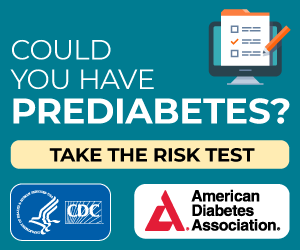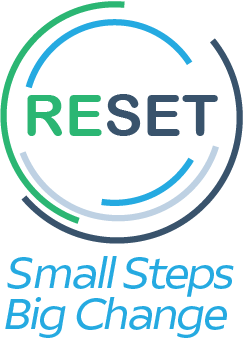It's a New Day in Public Health.
The Florida Department of Health works to protect, promote, and improve the health of all people in Florida through integrated state, county, and community efforts.
RESET: Small Steps, Big Change

Prediabetes Printable Risk Test
Register online for upcoming classes or contact us at 850-316-2764 to enroll in a program.
 RESET: Small Steps, Big Change is part of the National Diabetes Prevention Program. It is an evidence-based lifestyle change program to help people who have prediabetes or are at risk for type 2 diabetes, and prevent or delay development of type 2 diabetes by more than 58%.
RESET: Small Steps, Big Change is part of the National Diabetes Prevention Program. It is an evidence-based lifestyle change program to help people who have prediabetes or are at risk for type 2 diabetes, and prevent or delay development of type 2 diabetes by more than 58%.
Score of 5 or Higher on the Quiz
A score of 5 or higher means you are at a higher risk of developing prediabetes and automatically qualifies you for participation in the free program. Prediabetes, if left untreated, can increase your risk for developing type 2 diabetes.
Joining a CDC-recognized lifestyle change program is one of the most effective ways to prevent getting type 2 diabetes.
To enroll or learn more about the RESET: Small Steps, Big Change Program, contact 850-316-2764
Format of RESET: Small Steps, Big Change
RESET: Small Steps, Big Change lasts for one year and is offered in-person at the Florida Department of Health in Escambia County (DOH-Escambia) and local community centers.
In-person with Distance Learning: Groups meet at the same location for one year. Participants have the option of attending sessions in-person or remotely by calling-in or joining through a live video-conference. Groups meet weekly for the first four months, every other week for the next four months, followed by monthly meetings for the last four months. During each session, your lifestyle coach will teach a lesson on a different topic, lead a group discussion, and help you set and meet goals.
Worksites and Community Leaders: Reset: Small Steps, Big Change has lifestyle coaches available to offer the program directly to your organization. If you are interested in bringing the lifestyle change program to your worksite, community program, or place of worship, contact us to schedule an information session with your group.
- How Will this Program Help Me Prevent Diabetes?
- What Is the Benefit of Being Part of RESET: Small Steps, Big Change?
- Where Can I Participate in RESET: Small Steps, Big Change?
- Does RESET: Small Steps, Big Change Work?
- What Is Type 2 Diabetes?
- What Is Prediabetes?
- Who is at Risk for Prediabetes and How Do I Qualify?
- Can I Prevent Type 2 Diabetes?
- Your RESET: Small Steps, Big Change Lifestyle Coach
In this lifestyle change program, you will learn to:
- Eat a healthy diet
- Add physical activity to your routine
- Lose weight and maintain a healthy weight for life
- Manage stress
- Understand and respond to your food cues
- Stay motivated
- Solve problems and overcome challenges that get in the way of making healthy changes
As part of a RESET group, you will work with other participants and a trained lifestyle coach to learn the skills you need to make lasting changes. These changes include losing a modest amount of weight, being more physically active, and managing stress.
Being part of a group provides support from other people who are facing similar challenges and trying to make the same changes you are. Together you can celebrate successes and find ways to overcome obstacles.
Free classes will be offered at the:
Florida Department of Health in Escambia County
1295 West Fairfield Drive
Pensacola, FL 32501
Call 850-316-2764 for class schedule information.
The RESET: Small Steps, Big Change Program can help people with prediabetes cut their risk of developing type 2 diabetes by more than half.
The Diabetes Prevention Program research study showed that making modest behavior changes helped participants lose 5-7% of their body weight (10 to 14 pounds for a person weighing 200 pounds).
These lifestyle changes reduced the risk of developing type 2 diabetes by 58% in people with prediabetes.
Type 2 diabetes is the most common form of diabetes. Most of the food we eat is turned into glucose, or sugar, for our bodies to use for energy. The pancreas, an organ that lies near the stomach, makes a hormone called insulin to help glucose get into the cells of our bodies.
When you have type 2 diabetes, your body can’t use its own insulin as well as it should. This causes sugar to build up in your blood.
Type 2 diabetes is a serious condition. It can lead to health issues such as heart attack, stroke, blindness, kidney failure, or loss of toes, feet, or legs.
Prediabetes is a blood glucose (sugar) level that is higher than normal but not high enough to be diagnosed as diabetes.
It is estimated that one in three American adults has prediabetes, and most do not even know they have it.
If you have prediabetes and do not lose weight or do moderate physical activity, you can develop type 2 diabetes within five years.
If you have these risk factors, you may be at higher risk than others for prediabetes and type 2 diabetes.
- You are overweight.
- You are 45 years of age or older
- Your parent or sibling has type 2 diabetes
- You are physically active fewer than three times per week
- You ever gave birth to a baby that weighed more than nine pounds
- You ever had diabetes while pregnant (gestational diabetes)
If you think you may be at risk, a health care provider can do a blood test to see if you have diabetes or prediabetes.
You can join the program if you:
- Are 18 or older.
- Are overweight (BMI greater than 25 or greater than 23 for people of Asian heritage).
- Can't already be diagnosed with diabetes
- Previously diagnosed with Gestational Diabetes
- Have prediabetes:
- Recent blood test
- Score of 5 or higher on the Prediabetes Risk Test
Yes! Hearing your doctor say, “You’re at risk for type 2 diabetes,” or “You have prediabetes,” means that you can start preventing type 2 diabetes today. And you do not have to do it alone.
Finding the RESET: Small Steps, Big Change Program was your first step on that journey. If you have prediabetes, now is the time for prevention.
The Flordia Department of Health in Escambia County's RESET: Small Steps, Big Change lifestyle change program can help you take charge of your health to prevent or delay type 2 diabetes.
RESET: Small Steps, Big Change lifestyle coaches have the experience and training to help you reach your goals. Your lifestyle coach will help you:
- Learn the facts about healthy eating and physical activity and explain how these behaviors will help reduce your risk for type 2 diabetes
- Set and meet your goals
- Build relationships with other participants
- Work as a group to meet challenges
Our lifestyle coaches come from a variety of professional backgrounds, including health coaches and registered dietitians. Your lifestyle coach will adapt the sessions to match your group’s background, interests, and needs. For example, your coach may:
- Show you how to prepare healthy versions of popular local or ethnic foods and ask for ideas from group members
- Provide tips for eating healthy during cultural holidays or events
- Share fun local events that can help you be physically active
- Give you handouts to address your specific concerns
Resources
- Information on Small Steps, Big Change Curriculum.
- Read testimonials about successes from former program participants.
- Diabetes Care During Disasters



Connect with DOH